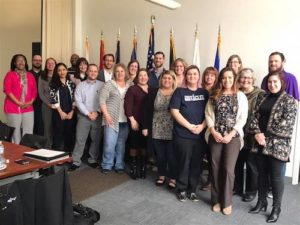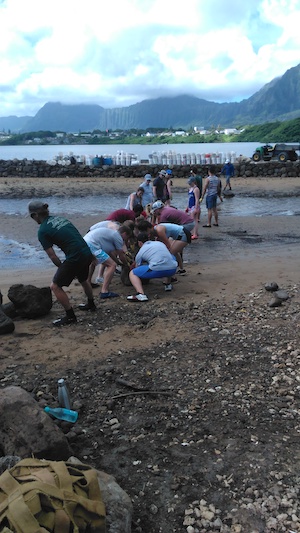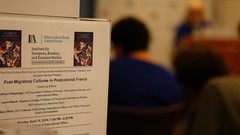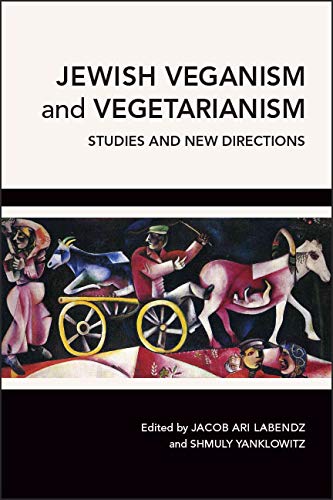People & Places: April 2019
Along with his colleagues, Assistant Professor of Biology Matt Venesky recently published two research articles in peer-reviewed journals. The first article, titled “Impacts of thermal mismatches on disease prevalence are moderated by life stage, body size, elevation and latitude,” was published in the journal Ecology Letters and represents collaborative work done with researchers at the University of South Florida. The second article, titled “Influence of substrate orientation on tadpole feeding efficiency and growth,” was published in the journal Biology Open and represents collaborative work done with colleagues at numerous universities in Brazil.
Assistant Professor of Religious Studies Adrienne Krone‘s research on Jewish community farms was published in the edited volume Jewish Veganism and Vegetarianism in April 2019 by SUNY Press. Krone’s chapter, “Opening the Tent: Jewish Veganism as an Expression of an Ecological Form of Judaism,” explores the construction of new Jewish and vegan identities within the Jewish Community Farming movement in North America.
English majors Lauren Fugate and Olivia Blakeslee received an Honorable Mention from the Council on Undergraduate Research for their poster application, “The Power of Firsthand Narratives for Vietnamese Refugees in America,” to the 23rd annual Posters on the Hill event. While their application was not chosen, CUR recognized the abstract for its demonstration of “exceptionally high quality research.” The application reflected summer research done at the Library of Congress with Assistant Professor of English Aline Lo. Their project, “Beyond Exile: Refugee Narratives in Contemporary American Literature,” was funded by the Great Lakes Colleges Association (GLCA)-Library of Congress Faculty-Student Research Program.
Assistant Professor of English Aline Lo was awarded a research grant from the Friends of the University of Wisconsin-Madison Libraries. Lo will use her time at UW-Madison to do research on Hmong folklore and their resettlement in French Guiana, using the library’s Father Yves Bertrais Collection. Father Bertrais was a French priest who did missionary work in Laos and is credited for helping to transition Hmong language from orality to textuality. He was part of the first group to resettle in French Guiana after the Vietnam War.
Allegheny Veteran Service club members John Fazio ’19, Lena Gemmer ’20, and Nyonna Towler ’22 recently appeared in an Armstrong Local Programming video with Anthony and Marsha Pedone, founders of the Veterans Project at Lilac Springs, to discuss their volunteer work with veterans in Crawford County.
 Associate Professor of English and Director of Writing Alexis Hart joined other members of the Writing with Current, Former, and Future Members of the Military Standing Group at the Conference on College Composition and Communication in Pittsburgh to hold a workshop on writing case notes with staff from Veterans Leadership Program of Western PA. Hart was also selected to participate in the 2019–2021 research seminar on Writing Beyond the University: Fostering Writers’ Lifelong Learning and Agency at Elon University.
Associate Professor of English and Director of Writing Alexis Hart joined other members of the Writing with Current, Former, and Future Members of the Military Standing Group at the Conference on College Composition and Communication in Pittsburgh to hold a workshop on writing case notes with staff from Veterans Leadership Program of Western PA. Hart was also selected to participate in the 2019–2021 research seminar on Writing Beyond the University: Fostering Writers’ Lifelong Learning and Agency at Elon University.

Assistant Professor of Global Health Studies Pamela Runestad‘s essay appeared with a former student’s essay in this month’s issue of Practicing Anthropology. Together, the essays describe the importance of experiential learning in global health. Runestad’s photo is also the cover art for the issue.
Professor of Political Science Shannan Mattiace was invited panel participant in “Author Meets Critics” roundtable to discuss the María Inclán’s new book, The Zapatista Movement and Mexico’s Democratic Transition, at the Midwest Political Science Association Meetings, Chicago, IL, April 5, 2019. Mattiace also was co-author, with Sandra Ley and Guillermo Trejo, of “Indigenous Resistance to Criminal Governance: Why Regional Ethnic Autonomy Institutions Protect Communities from Narco Rule in Mexico” in Latin American Research Review 54.1 (April 2019): 1-20. This journal is the interdisciplinary journal of the Latin American Studies Association. Mattiace presented a preliminary version of this work at a Faculty Lecture at Allegheny in March 2017. Some of the good comments received at this lecture made their way into the final version of this paper.
 Candaisy Crawford ’19 and Assistant Professor of Political Science Andrew Bloeser presented their study (co-authored with Visiting Assistant Professor of Political Science Tarah Williams), “We Just Don’t Want to See It: The Desire for Authoritarianism and the Diffusion of Responsibility,” at the 2019 Midwest Political Science Association Meeting. The study uses a dataset collected by the Center for Political Participation. The study highlights the erosion of democratic attitudes in the American public and the preference for “strongman” leaders.
Candaisy Crawford ’19 and Assistant Professor of Political Science Andrew Bloeser presented their study (co-authored with Visiting Assistant Professor of Political Science Tarah Williams), “We Just Don’t Want to See It: The Desire for Authoritarianism and the Diffusion of Responsibility,” at the 2019 Midwest Political Science Association Meeting. The study uses a dataset collected by the Center for Political Participation. The study highlights the erosion of democratic attitudes in the American public and the preference for “strongman” leaders.
Paula Schaefer, administrative assistant for the vice president for enrollment and dean of admissions, along with research colleagues, published a book chapter in The Routledge Handbook of Second Language Research in Classroom Learning. The chapter, titled “Effects of crosslinguistic similarity, complexity, and depth of processing on vocabulary recall,” investigates various factors that affect vocabulary learning of an unknown language. The handbook aims to provide a better understanding of the psycholinguistic processes of second language learners in classroom environments.
The April 2019 meeting of the Consortium for Computing in Undergraduate Education (C-CUE), an organization of higher education information technology professionals, was held on the Allegheny campus. The meeting, hosted by members of the Library and Information Technology Services (LITS) team, drew 40 participants from regional colleges and universities for the day’s program. The program consisted of presentations and discussions on the theme of service management, internal processes, and systems that allow for more effective execution of responsibilities.
In addition to the sessions presented by other members of C-CUE, the following Allegheny participants shared expertise and insight during the course of their presentations. The programmer analyst team of Mark Erdeljac, Luke Fritz, Marissa Kawinski, and Molly Smith presented their development of the Fun Friday program and the benefits experienced from holding collaborative open office hours for the Allegheny community. Jason Ramsey, director of enterprise services, presented on developing a culture of data governance. Aimee Reash, director of public services, discussed the work and benefits of unifying the Research Help Desk, Circulation Desk, and IT Help Desk into a single service point of the LITS InfoDesk.
Assistant Professor of Biology Yee Mon Thu served as a judge for the 23rd annual American Society for Biochemistry and Molecular Biology (ASBMB) Undergraduate Poster Competition in Orlando, Florida, on April 6, 2019. The competition is a part of the 2019 ASBMB annual meeting and is a venue for undergraduate young scholars to come together and share their research. Every presenter also receives constructive feedback on their research and presentation.
Professor of Philosophy Eric Palmer has published “What is development?” in Lori Keleher and Stacy Kosko, eds., Agency and Democracy in Development Ethics (Cambridge University Press, 2019). The chapter presents a theoretical engagement with the ideal of development present in Martha Nussbaum’s Human Development or Capabilities Approach and development theory authored by David Crocker. Palmer will present at Crocker’s retirement event at the University of Maryland on Commencement weekend.

Professor of French and International Studies Laura Reeck gave a book launch talk with co-editor Kathryn Kleppinger at the Elliott School of International Affairs at The George Washington University. Their edited volume, Post-Migratory Cultures in Postcolonial France, was the 2018 annual volume of the Society for Francophone Postcolonial Studies.
Lisa Whitenack, associate professor of biology and geology, is a coauthor of “Feeding in Cartilaginous Fishes: An Interdisciplinary Synthesis” in the recently published book Feeding in Vertebrates: Evolution, Morphology, Behavior, Biomechanics (Springer Publishing, 2019). The chapter details how the physiology, ecology, and behavior of sharks, rays, and chimeras influence their feeding habits, making them more than just opportunistic predators.
